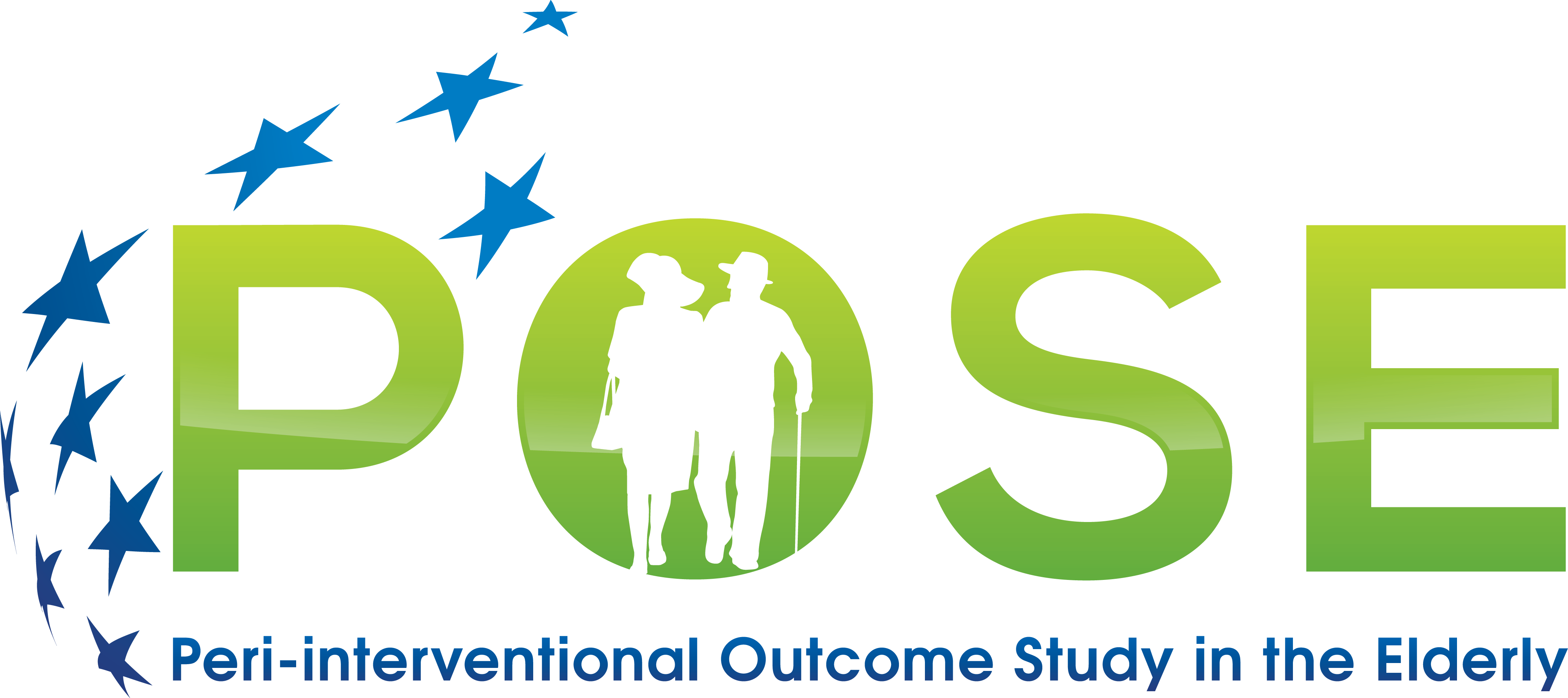POSE SecondaryAnalysis_Guideline Sept 2020_V2.0 final
POSE Secondary Analysis_Study Proposal Document
Approved submitted Secondary Analyses:
1). Title: Blood loss in the elderly anticoagulated patient in elective surgery. Hypothesis: We hypothesise that the risk of bleeding in the elderly on anticoagulants on admission is higher than patients not receiving anticoagulants in elective surgery. (Jacob Steinmetz, Copenhagen, Denmark) Published January 2023 Hjelmdal et al. http://dx.doi.org/10.1111/aas.14197 view here
Study protocol of this secondary analysis here
2). Title: The centenarian surgical patients in Europe. Does extreme age involve the selection of the non-frail for surgery? Hypothesis: We hypothesise that frailty and cognition is significantly better among the centenarians as the elderly patients above 90 years in POSE. (Jacob Steinmetz, Copenhagen, Denmark)
Study protocol of this secondary analysis here
3). Title: Is surgery during night time a risk factor in the elderly? Hypothesis: We hypothesise that night time surgery is associated with an increased mortality in the elderly patient as compared to surgery during day time. (Jacob Steinmetz, Copenhagen, Denmark)
4.) Title: The elderly surgical population in Denmark. Hypothesis: We hypothesise that the Danish cohort has a lower 30-day mortality than the other European cohorts. (Jacob Steinmetz, Copenhagen, Denmark)
5.) Title: Association of benzodiazepine premedication and 30-day mortality rate in the elderly surgical patient. Hypothesis: We hypothesise that a propensity score matched analysis will abolish the significant effect for premedication with benzodiazepines on the 30-day survival of the patients in the POSE cohort. (POSE-Study team) Published March 2022: Kowark et al. Association between benzodiazepine premedication and 30-day mortality rate: A propensity-score weighted analysis of the Peri-interventional Outcome Study in the Elderly (POSE). EJA 2022. 1;39(3):210-218. view here
6.) Title: Influence of circadian variation on hospital length of stay after surgery in the older patient. Hypothesis: We hypothesise that hospital length of stay is increased in patients having undergone interventions in the morning compared to patients operated on in the afternoon. (Steffen Rex and Jos Tournoy, Leuven, Belgium) Published August 2022 Hoogma et al. EJAIC doi: 10.1097/EA9.0000000000000005 view here
7.) Title: Predictors for 30-day postoperative functional and cognitive decline in the elderly patient. Hypothesis: Pre-admission living situation, chronic intake of antipsychotics and premedication are associated with postoperative functional and cognitive decline. (Steffen Rex and Jos Tournoy, Leuven, Belgium)
8.) Title: French cohort of the Peri-Interventional Outcome Study. Hypothesis: The elderly are a category of more fragile patients. It is known that their mortality due to surgery with anesthesia is higher. Identifying the risk factors for perioperative morbidity and mortality among elderlies in France could help reduce the rate of perioperative morbidity and mortality in this patients category of a French cohort. (Gilles Lebuffe and Sophie Barthélemy- doctoral thesis-, Lille, France)
9.) Title: Characteristics and postoperative trajectories of elderly patients undergoing hip or femur surgery in Europe. Hypothesis: We hypothesise that besides the country, kind of referring institution, functional and cognitive status, severity and urgency of intervention, age, multimorbidity, frailty, a limited mobility TUG test, use of blood products, the use of general anaesthesia, a postoperative stay that takes not place in a geriatric support unit and an unplanned ICU stay are associated with higher all‐cause mortality and change in functional outcome. We hypothesise that baseline characteristics and postoperative trajectories differ throughout Europe. (Linda Grüßer, Aachen, Germany)
10.) Title: Comparison of characteristics and outcome of eldery in- versus outpatients undergoing interventions with anaesthesia care in Europe. Hypothesis: We hypothesise that outpatients have a lower overall 30‐day mortality and better functional and neurocognitive outcome. (Linda Grüßer, Aachen, Germany)
Detailed study proposal here
11.) Title: Impact of anaesthesia depth monitoring on the outcome of elderly patients using propensity score matching Hypothesis: Patients who underwent surgery under intraoperative neuromonitoring are more likely to preserve their functional and cognitive status. (Sebastian Ziemann, Aachen, Germany)
12.) Title: Functional status and mortality of elderly patients following cancer surgery. Hypothesis: Cancer surgery in patients aged 80 years and older is associated with an elevated 30-day mortality and a high risk of postoperative functional and cognitive decline. (Sebastian Ziemann, Aachen, Germany)
13.) Title: Use of Volatile Anaesthesia in the Elderly Provoke Poor Outcome. Hypothesis: Use of volatile anesthesia in very old patients is associated with poor outcome. (Thomas Saller, Munich, Germany)
14.) Title:Prevalence and impact of anaemia in elderly surgical patients. Hypothesis: To estimate the prevalence of anaemia of elderly patients undergoing surgery and its impact on surgical outcome and transfusion practice. Subgroup analyses depending on the different surgical disciplines. (Patrick Meybohm, Würzburg, Germany)
15.) Title: Impact of monitoring cardiac output on outcomes of eldery surgical patients. Hypothesis: Determining cardiac output is associated with shorter length of stay in hospital in surgical patients ≥80 yrs (Ulf Guenther, Oldenburg, Germany)
16.) Title: Outcomes of the eldery surgical patients in Germany. Hypothesis: Postoperative mortality in Germany is not different from other European countries in patients ≥80 yrs. (Ulf Guenther, Oldenburg, Germany)
Preplanned Secondary Analyses according to the study protocol, which will be performed by the POSE study team:
1.) To compare the postoperative in-hospital and 30-day outcome with preoperatively via NSQIP risk calculator and POSPOM predicted outcome for surgeries
2.) To assess current practice of intra-interventional monitoring for elderly patients
3.) To identify differences in the geriatric peri-interventional management in health-care systems across Europe (hospital characteristics/ available beds/ number of admissions)
4.) Subgroup-analyses of the mortality until day 30 with regard to age, pre-interventional morbidities and type of surgery (e.g. orthopaedic) or non-surgical intervention, gender, centre and country
5.) Analysis of factors, which determine planned or unplanned admission to ICU after intervention
6.) To analyse differences in outcomes associated with the hospital-infrastructure data
